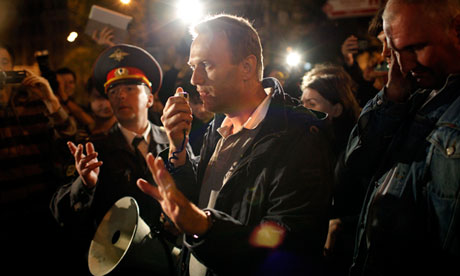Trial of corruption crusader Alexei Navalny divides Russia
The state accuses Alexei Navalny of embezzling funds, but his supporters say he is paying the price for criticising Vladimir Putin
Miriam Elder in Moscow
The Observer, Saturday 13 April 2013 14.46 BST

Alexei Navalny leads protests in Moscow last May, the day after Vladimir Putin’s inauguration. Photograph: Alexander Zemlianichenko Jr/AP
Russia has plunged into a propaganda battle over the trial this week of the leading opposition activist, Alexey Navalny.
Navalny will stand trial in the provincial city of Kirov, 500 miles north-east of Moscow, for allegedly leading a criminal group to embezzle 16m roubles (£335,750) from a state-owned timber company while advising the regional government several years ago.
However, his supporters believe – and now at least one top Russian official has hinted – that the case has been orchestrated to punish and ultimately silence Navalny, a lawyer, anti-corruption crusader, popular blogger and leading voice of the anti-Kremlin street protests that gripped Russia last year.
Journalists and supporters of Navalny have booked all flights to Kirov and all hotel rooms in the city. "It's hard to know how many people to expect," said Georgy Alburov, a Navalny associate who flew to the city last week to set up a headquarters for supporters and the press.
Media savvy and with a huge presence on Russia's internet, Navalny has won tens of thousands of supporters who follow his work online and donate funds to his anti-corruption campaigns. He has no access to Russia's federal television channels, tightly controlled by the Kremlin and used to demonise any opposition to President Vladimir Putin.
Navalny, 36, faces up to 10 years in prison if found guilty. He became a force to be reckoned with during last year's electoral season, when Putin returned to the Kremlin following four years as prime minister. Protests rocked the capital and Putin fought back by arresting dozens of demonstrators, including the punk group Pussy Riot, and enacting repressive laws that critics say were designed to instil widespread fear. The protests fizzled out and anger at Putin retreated online.
Navalny returned to conducting stinging investigations of corruption involving officials from Putin's inner circle. Last summer he uncovered the fact that Alexander Bastrykin, the head of Russia's investigative committee and a close Putin ally, had secret property holdings in the Czech Republic. In recent months he exposed several MPs' secret ownership of luxury properties in the US and Canada. Two have since resigned.
In an interview published on Friday, Vladimir Markin, the spokesman for the investigative committee, a powerful department similar to the US FBI, admitted that Navalny's activities prompted the case against him.
"If a person uses all his power to bring attention to himself, who, you can even say, teases the authorities – saying, 'look, I'm so good compared to everyone else' – then interest in his past and the process of exposing him goes faster," Markin told Izvestiya, a pro-government newspaper. He denied, however, that the case was political. "Politics only figures in this case because of the person involved and his actions," he said.
Navalny's supporters have accused the government of holding the trial far from Moscow in order to cover up the fact that it is a political trial. "But Alexei has a lot of supporters – I don't think it will go off as quietly as our government wants it to," said Alexandra Astakhova, a journalist at Vedomosti, a respected financial daily, and the curator of a Facebook group called "The case against Navalny is a case against us all".
The group features Russians of all stripes contributing photographs of support for the embattled opposition leader – from toddlers to people in their 80s.
"We all want to show that we're not scared," Astakhova said. "People got interested in Pussy Riot on a global scale because it included so many themes – feminism, gay rights, religion. They're trying to turn the case against Navalny into a vulgar political-economic case to lessen the attention. Our goal is that that not be the case."
Yet behind all the activism lies a sense of dread. Kremlin critics have long expected the authorities, intolerant of high-level dissent, to move against Navalny. Navalny himself has said that he was prepared for arrest.
Those who have dared to criticise Putin to a large audience – from the fallen oligarch Mikhail Khodorkovsky to former KGB officer Alexander Litvinenko – have suffered harsh fates. Now, many Kremlin critics say, it is Navalny's turn.
"There are dreams when you know ahead of time how they will end – but there's nothing you can do to change the nightmarish logic of their plot or wake up from the dreamy horror," wrote Yury Saprykin, a journalist and opposition activist, describing the case against Navalny. "And I … can't think up a way for us all to get out of this nightmare."
